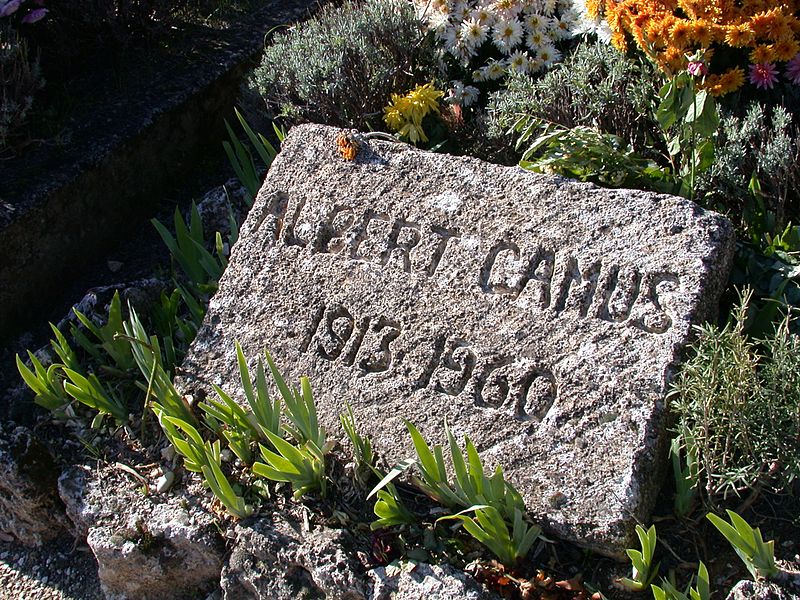A few years ago, on a holiday in Provence, I dragged my family to the village of Lourmarin to visit the grave of Albert Camus. Lourmarin is a pretty, well-preserved medieval town, but the nondescript cemetery outside its walls must be its least alluring feature. The graveyard was hot, dusty, and indifferently tended. My wife recalls the place as "depressing." But for me it was, in Michelin-guide terms, worth the journey to pay my respects to Camus.
There are not many authors I would classify as my heroes, but Camus is one of them. He was not just a superb writer, but a courageous man. Camus edited a Resistance newspaper during the occupation of France, and throughout his life consistently stood up for individual choice and dignity in the face of all forms of oppression and conformity--whether Stalinism, Naziism, or religious orthodoxy.
Camus' gravestone is simple and unadorned: just his name and dates. It took some time to find, because it was not specially marked. I stood by the slab for a few minutes. In the hot August afternoon, the Provençal sun pressing down on my head, I thought of the shimmering heat of the beach in Algiers, indelibly rendered in The Stranger. The humility of this resting-place touched me; it seemed perfectly suited to the man who lay there.
Now France's president, Nicolas Sarkozy, is lobbying to move Camus' remains to the Panthéon, the imposing (some would say bombastic) tomb that holds other great men and women of France--Voltaire, Victor Hugo, Marie Curie. His plan has stirred a heated controversy. It seems like the rankest ploy of an unpopular politician hoping to appropriate the aura of a figure revered in France. But even if Sarkozy is acting from the best of intentions, to move Camus from his provincial grave to the Panthéon is a stunningly wrongheaded idea. While Camus' daughter has apparently assented to the scheme, his son Jean is sticking up for the Lourmarin cemetery. The move, he says "would be contrary to his father’s wishes and [he] does not want to have his legacy put to work in the service of the state."
Jean is right. Camus should be allowed to remain in his quiet, sun-baked plot in the south of France--closer to his native Algeria and far from the machinations of the Elysée Palace. The Pantheon speaks of the greatness of France, but not the humanity of Camus.

Thanks for the post. Camus is one of my heroes too though I knew little of his personal history, for instance I had not realised he died at such a young age.
ReplyDeleteI have to disagree. Nothing would be better for today's French people to see Camus lionized a bit. In France today (that's where I live), there are no heroes; there are especially no heroes from WWII. Camus lived an exemplary life, and his writing was extraordinary. While he's criticized as being a "philosopher for high-school kids" (though my son never read Camus in lycée), his work is still pertinent. The move would give him a greater presence in the French mind.
ReplyDeleteDOT, I'm glad you liked the post. I hadn't thought much about Camus recently, and then happened to pick up a copy of the essay collection, RESISTANCE, REBELLION, AND DEATH in a bookstore. In our age of irony, snark, and postmodernism, good old-fashioned existentialism, especially when expressed with the passion and urgency of Camus, is particularly refreshing. So I had been recollecting my visit to Lourmarin at the very same time the Sarkozy business made the news.
ReplyDeleteKirkmc, I've been thinking too about Camus and high-school kids. Like probably every high-school French student in my generation, the first I knew of Camus was reading L'Etranger in 10th grade French. It's an odd, rather bleak book to teach a 10th grader and I'm sure the main reason it was on the syllabus is that the language is pretty simple. No doubt that simplicity and directness is one reason why Camus is looked down on by some.
I'm sure you are right that Camus--and the idea of heroism--deserves more honor in France, and perhaps installing him in the Panthéon would be a step in that direction. I would argue--and suspect Camus might too--that moving his bones amid pomp and circumstance would be a nice photo-op for Sarkozy that wouldn't do much to bring Camus' ideals alive in the culture. I hope France can rediscover him some other way.
Peter, re L'Etranger; I never read it in high-school French; we read Le Petit Nicolas. But later, when I was a wage slave and taking evening classes at the Alliance Française in New York, it was recommended to me because it contains no passé simple, always a problem for low-level readers. Nevertheless, it stuck with me, and I read many of his books, first in English, back then, and later in French (I have lived in France for the past 25 years).
ReplyDeleteAs for the photo-op; sure, but doesn't the overall value of the symbol eventually lead us to forget who was behind its orchestration?
I've never been to Lourmarin myself; I live a few hours away, and it's not far off the road between where I live and where my son is now at school. Your post made me realize that it would be a good stop-over. I've only visited a few famous graves in my time, but his is one worth visiting. (I'm currently reading a bio of Camus, and all this hullaballo incited me to buy his complete works in the Pléiade collection for Christmas):
http://www.mcelhearn.com/2009/11/25/my-christmas-present-albert-camus-complete-works/